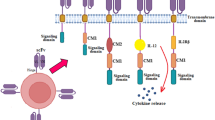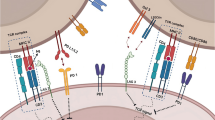Summary
There have been few reports stating that monoclonal antibody alone inhibits human solid tumor growth in vivo. The present study demonstrated that monoclonal antibody S1 (IgG2a), which recognized the antigenic determinant of the carbohydrate moiety, showed antibody-dependent cell (or macrophage)-mediated cytotoxicity (ADCC or ADMC) in conjunction with murine splenocytes of both BALB/c and athymic mice. In vivo experiments demonstrated that the antibody S1 clearly prolonged the survival of athymic mice which had been inoculated with a human liver carcinoma cell line. In addition, the antibody S1 significantly suppressed the human hepatoma line transplanted s.c. into nude mice. 125I-Labeled monoclonal antibody S1 revealed that the antibody accumulated significantly in the tumor mass. Many mononuclear cells were observed surrounding tumor cells when the antibody was given. This model system might be useful for analyzing the ADCC (or ADMC) mechanism in vivo.
Similar content being viewed by others
References
Capone PM, Papsidero LD, Croghan GA, Ming Chu T (1983) Experimental tumoricidal effects of monoclonal antibody aganst solid breast tumors. Proc Natl Acad Sci USA 80:7328
Hellström I, Hellström KE, Yeh M (1981) Lymphocyte-dependent antibodies to antigen 3.1, a cell-surface antigen expressed by a subgroup of human melanomas. Int J Cancer 27:281
Hellström I, Brankovan V, Hellström KE (1985) Strong antitumor activities of IgG3 antibodies to a human melanoma-associated ganglioside. Proc Natl Acad Sci USA 82: 1499
Hellström I, Beaumier PL, Hellström KE (1986) Antitumor effects of L6, an IgG2a antibody that reacts with most human carcinomas. Proc Natl Acad Sci USA 83:7059
Herlyn D, Koprowski H (1982) IgG2a monoclonal antibodies inhibit human tumor growth through interaction with effector cells. Proc Natl Acad Sci USA 79:4761
Herlyn D, Powe J, Ross AH, Herlyn M, Koprowski H (1985) Inhibition of human tumor growth by IgG2a monoclonal antibodies correlates with antibody density on tumor cells. J Immunol 134:1300
Houghton AN, Mintzer D, Cordon-Cardo C, Welt S, Fliegal B, Badhan S, Carswell E, Melamed MR, Oettgen HF, Old LJ (1985) Mouse monoclonal IgG3 antibody detecting GD3 ganglioside: A phase I trial in patients with malignant melanoma. Proc Natl Acad Sci USA 82:1242
Imai K, Ferrone S (1980) An indirect rosette microassay to characterize human melanoma associated antigens (MAA) recognized by operationally specific xenoantisera. Cancer Res 40:2252
Imai K, Ng AK, Ferrone S (1981) Characterization of monoclonal antibodies to human melanoma associated antigens. J Natl Cancer Inst 66:489
Imai K, Ng AK, Glassy MC, Ferrone S (1981) Differential effect of interferon on the expression of tumor associated antigens and histocompatibility antigens on human melanoma cells: Relationship to susceptibility to immune lysis mediated by monoclonal antibodies. J Immunol 127:505
Imai K, Wilson BS, Kay NE, Ferrone S (1981) Monoclonal antibodies to human melanoma cells: Comparison of serological results of several laboratories and molecular profile of melanoma associated antigens. In: Hammerling GJ, Hammerling U, Kearney JF (eds) Monoclonal antibodies and T cell hybridomas. Elsevier North Holland Biomedical Press, New York, p 183
Imai K, Pellegrino MD, Wilson BS, Ferrone S (1982) Higher cytolytic efficiency of an IgG2a than of an IgG1 monoclonal antibody reacting with the same (or spatially close) determinant on a human high-molecular-weight melanoma-associated antigen. Cell Immunol 72:239
Imai K, Nakanishi T, Noguchi T, Yachi A, Ferrone S (1983) Selective in vitro toxicity of purothionin conjugated to the monoclonal antibody 225.28S to a human high-molecular-weight melanoma-associated antigen. Cancer Immunol Immunother 15:206
Imai K, Sasanami T, Fujita H, Moriya Y, Tsujisaki M, Yachi A (1983) Antibody-dependent cell mediated cytotoxicity using monoclonal antibodies reacting with CEA. Ann NY Acad Sci 417:443
Imai K, Moriya Y, Fujita H, Tsujisaki M, Kawaharada M, Yachi A (1984) Immunologic characterization and molcular profile of carcinoembryonic antigen detected by monoclonal antibodies. J Immunol 132:2992
Imai K, Sasanami T, Nakanishi T, Noguchi T, Yachi A (1985) Circulating blood group-related antigen(s) in cancer patients detected by the monoclonal antibodies produced against hepatocellular carcinoma line. Tumour Biol 6:257
Kipps TJ, Parham P, Punt J, Herzenberg LA (1985) Importance of immunoglobulin isotype in human antibody-dependent, cell-mediated cytotoxicity directed by murine monoclonal antibodies. J Exp Med 161: 1
Krolick KA, Uhr JW, Vitetta ES (1982) Selective killing of leukemia cells by antibody-toxin conjugates. Nature 295:604
Kuwahara T (1980) Heterotransplantation of human hepatoma in nude mice. Establishment of the serially transplantable hepatoma. Acta Hepatol 21:303
Matsui M, Nakanishi T, Noguchi T, Imai K, Yachi A, Ferrone S (1985) Suppression of human melanoma growth in nude mice injected with anti-high-molecular-weight melanoma-associated antigen monoclonal antibody 225.28S conjugated to purothionin. Jpn J Cancer Res (Gann) 76:119
Ralph P, Nakoins I (1980) All classes of murine IgG antibody mediate macrophage phagocytosis and lysis of erythrocytes. J Immunol 125:1885
Ralph P, Nakoins I (1983) Cell-mediated lysis of tumor targets directed by murine monoclonal antibodies of IgM and all IgG isotypes. J Immunol 131:1028
Seto M, Umemoto N, Saito M, Masuho Y, Hara T, Takahashi T (1982) Monoclonal anti-MM46 antibody: ricin A chain conjugate: in vitro and in vivo antitumor activity. Cancer Res 42:5209
Steplewski Z, Lubeck MD, Koprowski H (1983) Human macrophages armed with murine immunoglobulin G2a antibodies to tumors destroy human cancer cells. Science 221:865
Trowbridge IS, Domingo LD (1981) Anti-transferrin receptor monoclonal antibody and toxin-antibody conjugated effect growth of human tumor cells. Nature 294:171
Vitetta Es, Cushley W, Uhr JW (1983) Synergy of ricin A chain-containing immunotoxins and ricin B chain-containing immunotoxins in vivo killing of neoplastic human B cells. Proc Natl Acad Sci USA 80:6332
Wilson BS, Imai K, Natali PG, Ferrone S (1981) Distribution and molecular characterization of a cell surface and a cytoplasmic antigen detectable in human melanoma cells with monoclonal antibodies. Int J Cancer 28:293
Author information
Authors and Affiliations
Rights and permissions
About this article
Cite this article
Fukuda, Y., Imai, K., Miura, K. et al. A monoclonal antibody to the carbohydrate chain on human hepatocellular carcinoma-associated antigen which suppressed tumor growth in nude mice. Cancer Immunol Immunother 27, 26–32 (1988). https://doi.org/10.1007/BF00205754
Received:
Accepted:
Issue Date:
DOI: https://doi.org/10.1007/BF00205754




